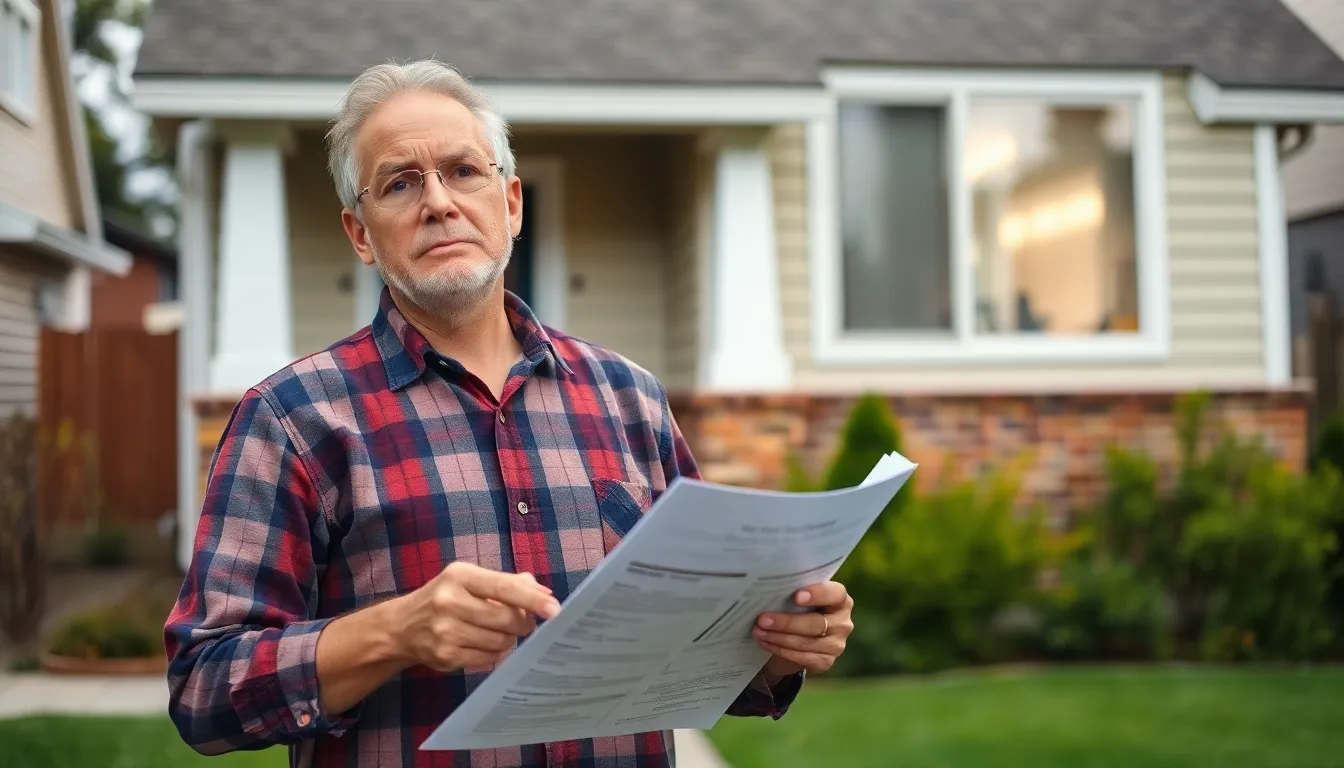In the great debate of renting versus buying, it often feels like choosing between pizza and tacos—both delicious but oh so different. Renting offers flexibility, like a free spirit dancing through life, while buying is more like committing to a long-term relationship with a mortgage. One lets you pack up and move at a moment’s notice, while the other ties you down with a 30-year commitment that makes marriage look like a fling.
But which option really gets the better slice of the pie? Is it better to pay someone else’s mortgage or invest in a place that’s yours? This article dives into the nitty-gritty of both choices, weighing the pros and cons with a sprinkle of humor. Whether you’re a nomadic adventurer or a homebody at heart, understanding these two paths will help you make the decision that’s right for you.
Table of Contents
ToggleOverview of Renting and Buying
Renting offers flexibility, allowing individuals to relocate easily as their needs change. It typically requires a lower initial financial commitment, often involving just a security deposit and the first month’s rent. Many appreciate this aspect, especially those who might not be ready for a long-term investment.
Contrasting this, buying a home involves a significant upfront investment, including a down payment and closing costs. Homebuyers build equity over time, which contributes to long-term financial stability. Appreciation in property value can enhance wealth as well.
Renters often enjoy fewer maintenance responsibilities, as landlords typically handle repairs and upkeep. This convenience appeals to people who prefer minimal interference in their living situation. Homeowners, however, bear all maintenance costs, which can lead to fluctuations in monthly expenses.
Financial predictability with renting comes from fixed lease agreements. Renters know their monthly payment, allowing for easier budgeting. In buying, mortgage payments can vary based on interest rates and property taxes, making accurate financial forecasting more complex.
Tax advantages exist for homeowners, such as mortgage interest deductions. This benefit can significantly reduce taxable income and enhance affordability. Renters miss out on such breaks, which can limit potential savings.
Both options serve different lifestyle preferences. Those valuing stability, investment, and control may favor buying. Conversely, individuals prioritizing mobility and lower initial costs often lean towards renting. Understanding the nuances of renting versus buying helps individuals align housing choices with personal priorities.
Financial Considerations

Evaluating financial factors remains crucial when comparing renting and buying a home. Each option comes with distinct costs and long-term impacts.
Monthly Costs Comparison
Monthly expenses show a stark contrast between renting and buying. Renters typically incur predictable costs, commonly limited to rent and utility payments. They often spend an average of $1,400 per month depending on location and unit type. Homeowners, on the other hand, face mortgage payments, property taxes, insurance, and maintenance costs. Mortgage payments can average $2,000 monthly, influenced by loan terms and interest rates. Homeownership often leads to unexpected expenses like repairs and upkeep, making budgeting more complex. Renters enjoy the advantage of landlords managing maintenance and repairs, resulting in fewer financial surprises.
Long-term Financial Implications
Long-term financial outcomes differ significantly between renting and buying. Homebuyers build equity over time, increasing their net worth as property values appreciate. In contrast, renters do not accumulate any equity, focusing solely on their monthly payments. On average, home values appreciate around 4% annually, which can result in substantial gains over years. Homeowners can also benefit from tax deductions on mortgage interest and property taxes, adding to overall savings. Renters, lacking these benefits, miss opportunities for long-term wealth accumulation. Choosing between these options ultimately shapes one’s financial future, emphasizing the importance of weighing each path carefully.
Lifestyle Factors
Lifestyle factors play a significant role when comparing renting and buying a home. Various personal preferences and life circumstances dictate which choice aligns best with an individual or family.
Flexibility vs. Stability
Flexibility appeals to many renters. They can relocate with relative ease, allowing for changes in job location or lifestyle preferences. Short lease terms often provide opportunities for new experiences without long-term commitments. Conversely, homeowners enjoy the stability of having a permanent residence. This sense of security can foster community ties and emotional investment in the property. While renters may prioritize the ability to move frequently, those seeking roots often find that buying suits their needs.
Maintenance Responsibilities
Maintenance responsibilities differ significantly between renters and homeowners. Renters typically bear minimal responsibilities, as landlords handle repairs and upkeep. This arrangement allows renters to focus on enjoying their living spaces without stress. On the other hand, homeowners must manage all aspects of home maintenance. Unplanned repairs can lead to unexpected costs, impacting monthly budgets. The distinction in these responsibilities can sway individuals toward one option or the other, depending on their preference for convenience or a desire for control over their living environment.
Market Trends
Market trends reveal significant insights into the current landscape of renting versus buying a home. Understanding these trends equips potential renters and buyers with crucial information to make informed decisions.
Real Estate Market Analysis
The real estate market demonstrates fluctuations that impact buying and renting choices. Recent data shows that home prices increased by approximately 7% over the last year, making buying less affordable for many. Interest rates on mortgages also rose, averaging around 6.5%, which adds financial pressure to potential buyers. In contrast, the number of available homes for sale decreased by 10%, contributing to a competitive market. This combination affects buyer confidence and pushes some to consider renting instead.
Rental Market Insights
The rental market offers its own set of trends worth noting. Rental prices have seen a 5% rise in urban areas, averaging about $1,400 monthly. Many renters seek apartments due to increased demand in cities. A consistent challenge for renters is the low vacancy rate, which hovers around 4%. This limited availability puts pressure on rental prices and can lead to bidding wars for desirable properties. Despite these challenges, the flexibility of renting remains appealing, especially for those uncertain about long-term commitments.
Pros and Cons of Each Option
When considering renting versus buying, it’s vital to evaluate the unique benefits and challenges presented by each choice.
Benefits of Renting
Renting offers flexibility that appeals to many individuals. This option allows for easy relocation and minimal commitment, ideal for those facing job changes or lifestyle shifts. Initial costs are typically lower, with only a security deposit and first month’s rent needed, making it accessible. Maintenance responsibilities largely fall on landlords, so renters avoid unexpected repair costs. Fixed lease agreements help with budgeting, providing financial predictability. Lastly, renters are not tied to property value fluctuations, allowing for easier transitions if the market changes.
Advantages of Buying
Homeownership comes with significant financial benefits. Individuals can build equity over time, while property appreciation increases value. A sizable upfront investment, including a down payment and closing costs, establishes a long-term asset. Homeowners enjoy tax deductions, particularly on mortgage interest, not available to renters. Stability stands out as a prominent feature of buying, fostering community connections and emotional ties to a residence. Additionally, managing properties allows for personalized improvements, enhancing living spaces according to personal preferences.
Deciding between renting and buying ultimately hinges on personal priorities and lifestyle choices. Renters appreciate flexibility and lower initial costs, which suit those who value mobility and minimal maintenance. On the other hand, buyers invest in stability and long-term financial benefits, like equity and tax deductions.
Current market trends further complicate this decision, making it essential for individuals to weigh their options carefully. Whether one prefers the adventure of renting or the commitment of homeownership, understanding these factors can lead to a more informed choice. Each path offers unique advantages that align with different life stages and financial goals.





